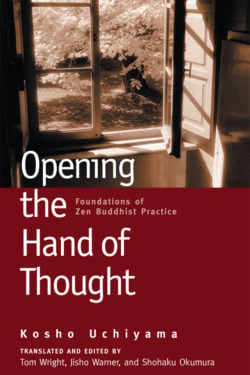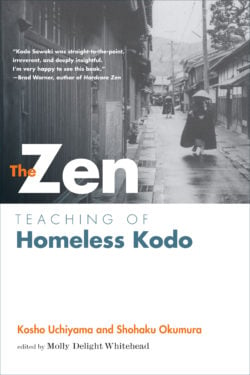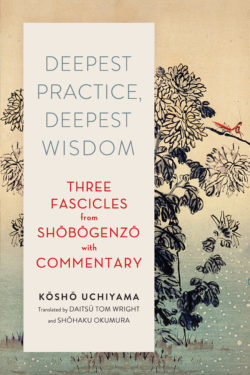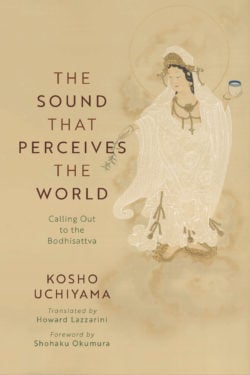Kosho Uchiyama
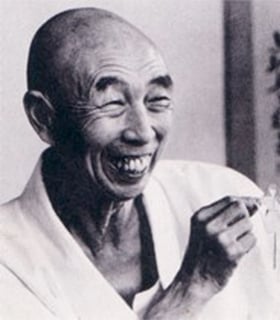
Kosho Uchiyama was a preeminent Japanese Zen master, instrumental in bringing Zen to America. The author of over twenty books, including Refining Your Life, he died in 1999.
Books, Courses & Podcasts
Opening the Hand of Thought
For over thirty years, Opening the Hand of Thought has offered an introduction to Zen Buddhism and meditation unmatched in clarity and power. This is the revised edition of Kosho Uchiyama’s singularly incisive classic.
This new edition contains even more useful material: new prefaces, an index, and extended endnotes, in addition to a revised glossary. As Jisho Warner writes in her preface, Opening the Hand of Thought “goes directly to the heart of Zen practice. . . showing how Zen Buddhism can be a deep and life-sustaining activity.” She goes on to say, “Uchiyama looks at what a person is, what a self is, how to develop a true self not separate from all things, one that can settle in peace in the midst of life.”
By turns humorous, philosophical, and personal, Opening the Hand of Thought is above all a great book for the Buddhist practitioner. It’s a perfect follow-up for the reader who has read Zen Meditation in Plain English and is especially useful for those who have not yet encountered a Zen teacher.
The Zen Teaching of Homeless Kodo
Printed on demand. This book will be printed especially for you and will ship from a separate warehouse.
Eschewing the entrapments of vanity, power, and money, Kodo Sawaki Roshi lived a traveling and “homeless” life, going from temple to temple, student to student, teaching and instructing and never allowing himself to stray from his chosen path. Always clear, often funny, he jolts us into awakening.
Kosho Uchiyama expands and explains his teacher’s wisdom with his commentary, drawing parallels between Zen teachings and Western philosophy. Shohaku Okumura adds his own insight, grounding his teachers’ power and sagacity for the contemporary practitioner. Through this book, experience the timeless, practical wisdom of three generations of Zen masters.
Deepest Practice, Deepest Wisdom
Famously insightful and famously complex, Eihei Dogen’s writings have been studied and puzzled over for hundreds of years. In Deepest Practice, Deepest Wisdom, Kosho Uchiyama, beloved twentieth-century Zen teacher addresses himself head-on to unpacking Dogen’s wisdom from three fascicles (or chapters) of his monumental Shobogenzo for a modern audience.
The fascicles presented here from Shobogenzo, or Treasury of the True Dharma Eye include “Shoaku Makusa” or “Refraining from Evil,” “Maka Hannya Haramitsu” or “Practicing Deepest Wisdom,” and “Uji” or “Living Time.” Tom Wright and Shohaku Okumura lovingly translate Dogen’s penetrating words and Uchiyama’s thoughtful commentary on each piece. At turns poetic and funny, always insightful, this is Zen wisdom for the ages.
The Sound that Perceives the World
Musings and autobiographically informed commentary on the human condition through the lens of the Kannon-gyo—chapter 25 of the Lotus Sutra—connecting Zen and Pure Land Buddhism through the practice of venerating and chanting the names of buddhas and bodhisattvas.
The Kannon-gyo is chapter 25 of the Lotus Sutra, and its focus is the bodhisattva of compassion, Avalokiteshvara, known in China as Guanyin, and in Japan as Kannon or Kanzeon. The text describes the many ways in which calling out the bodhisattva’s name—Namu Kanzeon Bosatsu—can relieve suffering.
Most schools of Zen Buddhism, and especially the Soto school, eschew such practices as chanting the names of buddhas and bodhisattvas, along with venerating such figures.
The eminent Soto Zen master Kosho Uchiyama Roshi, however, while doing hard physical labor early in his career, could not practice zazen—that is, formal sitting meditation. He came to appreciate the Kannon-gyo and the practices related to it. In particular, he took to reciting Kannon’s name, as recommended in the text of the Kannon-gyo.
Later in life, Uchiyama Roshi suffered from illness that again prevented him from practicing formal Zen, so he returned to the Kannon-gyo and the practice of chanting. He went so far as to assert that chanting Kannon’s name is completely equivalent to zazen, that the two practices are simply two sides of the same coin—a revolutionary idea seemingly at odds with Zen.
Chanting practice is especially accessible, as it can be done while working, traveling, or suffering from illness, and other activities that would ordinarily get in the way of formal Zen practice.
With these practices, the Kannon-gyo, and Kannon herself as a backdrop, Uchiyama Roshi muses about the purposes of religion, the goals of religious practice, and the meaning of enlightenment—and their relation to suffering itself.

